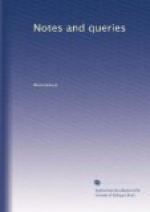“THE TALE OF THE WARDSTAFF.
The
Bailiffe of the Liberty.
“Iche athied[6] the staffe byleve,
Thanne staffe iche toke byleve,
Byleve iche will tellen[7]
Now the staffe have iche got.
Lord
of Ruckwood Hall.
“Tho the staffe to me com
Als he hoveon for to don,
Faire and well iche him underfing
Als iche hoveon for to don.
The
Bailiffe.
“All iche theron challenged,
That theron was for to challenge,
Nameliche,—this:—and—this:
And all that ther was for to challenge.
Lord
of Ruckwood.
“Fayer iche him uppdede
Als iche hoveon for to don.
The
Bailiffe.
“All iche warnyd to the Ward to
cum,
That therto hoveon for to cum,
By SUNNE SHINING.
Lord
of Ruckwood.
“We our roope theder brouhton,
A roope beltan[8],
Als we hoveon for don;
And there waren and wakeden,
And the Ward soe kept,
That the King was harmless,
And the Country scatheless.
The
Bailiffe.
“And a morn, when itt day was,
And the sun arisen was,
Faier honour weren to us toke,
Als us hoveon for to don.
The
Lords, and the Tenants
Fayre on the staffe we scorden,
Als we hoveon for to don,
Fayre we him senden,
Theder we hoveon for to sende.
The
Bailiffe.
And zif ther is any man
That this wittsiggen can
Iche am here ready for to don
Azens himself, iche one,
Other mid him on,
Other mid twyn feren,
Als we ther weren.
——
“Sir, byleve take this staffe,
This is the Tale of the Wardstaffe.”
It will be at once apparent that this is a corrupt transcript of a semi-Saxon original of much earlier date; and by comparing it with Morant’s very blundering copy, the conjectural corrections I have essayed will be perceived to be numerous. Many of then will, however, be found not only warranted, but absolutely necessary, from the accompanying prose account of the ceremony. The MS. from which it was taken by Morant, was an account of the Rents of the hundred of Ongar, in the time of John Stonar of Loughton, who had a grant of it for his life in the 34th year of King Henry VIII. He seems to have died 12th June, 1566, holding of the Queen, by the twentieth part of a knight’s fee, and the yearly rent of 13l. 16s. 4d., the manor, park, chase, &c., of Hatfield Broad Oak, with the hundreds of Ongar and Harlow; and the Wardstaff of the same hundreds, then valued at 101l. 15s. 10d. As the Wardstaff is said by Morant to make a considerable figure in old records, it is reasonable to hope that a more satisfactory account of it may still lie amongst unsunned ancient muniments. All the old Teutonic judicial assemblies




